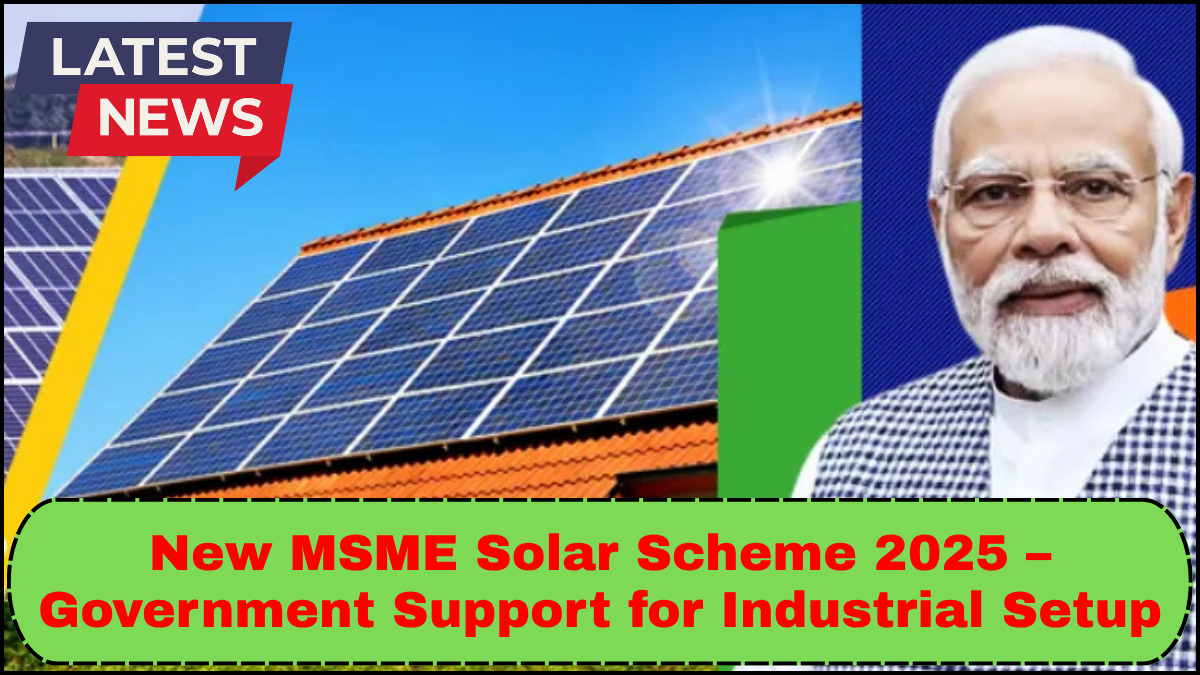As India pushes ahead with its renewable energy goals, the MSME Solar Equipment Scheme 2025 marks a major step in supporting small and medium-sized enterprises (SMEs) in transitioning to clean energy. This new initiative is tailored to help industries reduce power costs, improve sustainability, and increase competitiveness by subsidizing solar installations and streamlining access to solar infrastructure.

Below is a comprehensive look at the scheme, its benefits, eligibility, and impact on industrial growth.
What Is the MSME Solar Equipment Scheme 2025?
The MSME Solar Equipment Scheme 2025 is a central government initiative under the Ministry of Micro, Small and Medium Enterprises, launched to incentivize the adoption of solar energy systems by MSMEs. It offers financial support, technical assistance, and simplified regulatory pathways to promote solar-based industrial setups.
Key objectives include:
-
Reducing energy costs for MSMEs
-
Enhancing operational efficiency
-
Promoting environmental responsibility
-
Encouraging decentralized energy solutions
-
Driving innovation in renewable energy technology within small industries
Scope and Coverage of the Scheme
The scheme is designed for both existing MSMEs and new entrepreneurs planning to set up industrial units with solar-powered infrastructure. Support is offered across the value chain—covering solar panels, inverters, battery systems, mounting structures, and grid integration technology.
It includes:
-
Capital Subsidy: Up to 60% of the equipment cost depending on the sector and location.
-
Interest Subvention: Loans with interest subsidy up to 5% under partnerships with nationalized banks and NBFCs.
-
Solar Panel Grant for Small Industries: Grants up to ₹15 lakhs for micro and small units adopting rooftop or standalone solar systems.
-
Energy Audit Assistance: Financial help for conducting solar feasibility and energy audits.
-
Technology Upgrade Support: MSMEs shifting from diesel or coal to solar receive additional incentives.
Eligibility Criteria for MSMEs
To benefit from the MSME Solar Equipment Scheme 2025, businesses must meet certain eligibility conditions:
-
Must be registered under the Udyam Portal
-
Must fall under the manufacturing or service sector
-
Priority given to export-oriented units, clusters in power-deficient regions, and industries with high electricity consumption
-
The solar equipment must be sourced from MNRE-approved manufacturers
-
Units must commit to operating for a minimum period (typically 3-5 years) post-installation
How to Apply for the Scheme
Applying for support under the MSME Solar Equipment Scheme 2025 is a streamlined digital process:
-
Register on the official MSME portal or state-specific renewable energy development authority websites.
-
Submit proposal including project details, estimated energy savings, and solar vendor quotations.
-
Upload documentation – business registration, bank details, GST certificate, past electricity bills, and quotations.
-
Application Review – Approval is typically processed within 30–45 days.
-
Disbursal – Subsidy or grant disbursed post-installation and inspection.
MSMEs can also apply through empaneled solar service providers who assist with end-to-end project execution and compliance.
Economic and Environmental Benefits
The solar scheme isn’t just about cleaner energy—it’s a business enabler:
-
Cost Savings: Solar installation leads to 40–70% savings on power bills depending on load and state tariff.
-
ROI: Average return on investment is achieved in 2–3 years with subsidized equipment.
-
Reduced Dependency: Solar systems reduce dependence on unreliable grid power or expensive diesel gensets.
-
Green Certification: MSMEs using renewable energy can leverage eco-certification to boost export credibility.
-
Job Creation: The shift toward green energy is expected to create thousands of jobs in solar manufacturing, installation, and maintenance.
Key Industries That Benefit Most
Certain sectors are set to gain more from the MSME Solar Equipment Scheme 2025:
-
Textile units with heavy power looms
-
Plastic molding factories
-
Auto component manufacturers
-
Food processing plants
-
Cold storage facilities
-
Metal fabrication workshops
These industries often operate round-the-clock and are heavily dependent on electricity, making them ideal for solar integration.
Challenges and Government Solutions
Some common concerns with solar adoption include high upfront costs, lack of technical expertise, and space limitations. The scheme addresses these through:
-
Viability Gap Funding (VGF) for high-cost states or low-sunlight zones
-
Cluster-level shared solar parks for space-constrained units
-
Capacity-building workshops and training programs for MSME staff
-
Vendor certification and performance guarantee requirements
Future Outlook
The MSME Solar Equipment Scheme 2025 is expected to benefit over 2 lakh units by 2027, with a projected generation capacity of over 6 GW from the MSME sector alone. By fostering decentralized energy adoption, India is also taking steps to meet its COP commitments and lower its industrial carbon footprint.
FAQs
What is the MSME Solar Equipment Scheme 2025?
It is a government initiative to help MSMEs install solar energy systems by offering financial and technical support, including subsidies, grants, and low-interest loans.
Who can apply for the scheme?
Any registered micro, small, or medium enterprise in manufacturing or service sectors, particularly those with high power consumption.
What kind of financial support is provided?
Capital subsidy (up to 60%), interest subvention (up to 5%), and specific solar panel grants for small industries (up to ₹15 lakhs).
Are there any preferred industries?
Yes. High-energy-use sectors like textiles, food processing, plastics, and auto components are prioritized.
How long does it take to get approval?
Typically, the application is reviewed within 30–45 working days post-submission.
click here to learn more


